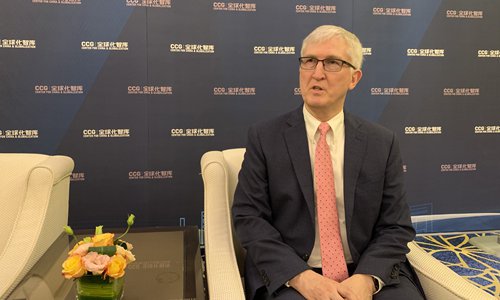HOME >> BUSINESS
AmCham chair foresees non-implementation of new tariffs in December as sign of progress
By Chen Qingqing and Bai Yunyi Source:Global Times Published: 2019/11/2 19:38:51 Last Updated: 2019/11/3 1:15:29

While Chinese and US trade negotiators held phone talks on Friday night, US business representatives highly anticipate a conclusion of the "phase-one" deal, besides considering that the non-implementation of the December tariffs will be a significant sign of the two sides making progress.
"I think the chances of concluding the phase one deal are very high because I think both governments see a lot benefits from concluding the deal." Tim Stratford, chairman at the American Chamber of Commerce in China, told the Global Times during the 6th China Inbound-Outbound Forum 2019 under the aegis of the Center for China and Globalization on Saturday in Beijing.
Trade consultations between China and the US are going smoothly and the two sides are moving the talks forward, despite the cancellation of the APEC summit in Chile, where an interim trade deal was widely expected to be signed.
While some analysts raised concerns over the intensified political and economic rivalry between the two countries that may lead to further decoupling, the chairman; however, stressed that China is still a very important market, and it would be the biggest mistake to say the two countries should be decoupled.
"It would be a tragic mistake on many different levels," Stratford said.
It's widely speculated that the US selling more agriculture products to China, further liberalization of the Chinese financial market is part of the deal, while the American business has strong hope that the tariff due on December 15 will not go into effect, "and that will be a sign that two sides feel they're making progress," Stratford said.
The US planned to add an additional tariff of 15 percent on part of some $300 billion worth of Chinese imports that is scheduled to take effect from December 15. If it becomes a reality, it would have a catastrophic impact on consumers and the technology sector.
"We're glad that the governments have been negotiating very seriously with each other, and we hope that they can reach an agreement on as many issues as possible," the chairman said, noting that if the agreement is finalized, it would stop the further downward spiral of the bilateral trade relationship.
And the "phase-one" deal will be built on that strong foundation that will further help in the progress of "phase-two."
The negative impact of a yearlong trade war between two of the world's largest countries has been heavily weighing on the economic prospects of the two sides. The US economy has been slowing and the Federal Reserve cut interest rates for the third time this year amid the trade war.
Trade war caused significant problems for the business community, as people had to either accept higher costs or they had to make changes to their supply chain of sourcing, as an immediate aftermath of the tariffs, Stratford noted.
"The other impact, which is more long-term, is uncertainty," he said, adding that businesses on both sides have been looking into replacements of each other.
Besides the "phase-one" deal, it may take a longer time for the two countries to make a broader deal, Stratford said. However, China and the US have entered a new period, and "there are a lot of uncertain questions that our governments have to figure out how to deal with in this new period," he said.
"I also think that the American trade negotiators understand that if we conclude an agreement now, uh, it will be harder to conclude the next agreement," the chairman added, as the next focus for the Trump administration is the presidential election campaign.
Posted in: ECONOMY